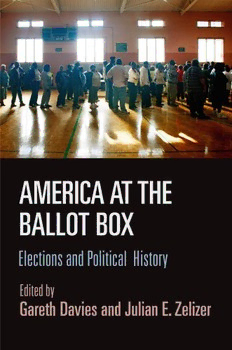
America at the Ballot Box: Elections and Political History PDF
Preview America at the Ballot Box: Elections and Political History
America at the Ballot Box POLITICS AND CULTURE IN MODERN AMERICA Series Editors Margot Canaday, Glenda Gilmore, Michael Kazin, Stephen Pitti, Thomas J. Sugrue Volumes in the series narrate and analyze po liti cal and social change in the broadest dimensions from 1865 to the present, including ideas about the ways people have sought and wielded power in the public sphere and the language and institutions of politics at all levels— local, national, and transnational. The series is motivated by a desire to reverse the fragmentation of modern U.S. history and to encourage synthetic perspectives on social movements and the state, on gender, race, and labor, and on intellectual history and pop u lar culture. AMERICA AT THE BALLOT BOX Elections and Po liti cal History Edited by Gareth Davies and Julian E. Zelizer UNIVERSITY OF PENNSYLVANIA PRESS PHILADELPHIA Copyright © 2015 University of Pennsylvania Press All rights reserved. Except for brief quotations used for purposes of review or scholarly citation, none of this book may be reproduced in any form by any means without written permission from the publisher. Published by University of Pennsylvania Press Philadelphia, Pennsylvania 19104–4112 www.upenn.edu/pennpress Printed in the United States of America on acid- free paper 10 9 8 7 6 5 4 3 2 1 A Cataloging- in- Publication record is available from the Library of Congress ISBN 978-0-8122-4719-0 To the pioneers of the fields of Policy History and American Political Development who inspired our generation of political historians This page intentionally left blank CONTENTS Introduction Gareth Davies and Julian E. Zelizer 1 1. Th e Devolution of 1800: Jeff erson’s Election and the Birth of American Government Jeff rey L. Pasley 13 2. Th e Bombshell of 1844 Sean Wilentz 36 3. Beyond the Realignment Synthesis: Th e 1860 Election Reconsidered Adam I. P. Smith 59 4. Markets, Morality, and the Media: Th e Election of 1884 and the Iconography of Progressivism Richard R. John 75 5. Anglophobia in Nineteenth- Century Elections, Politics, and Diplomacy Jay Sexton 98 6. Th e War and Peace Election of 1916 Elizabeth Sanders 118 7. Farewell to the “Smoke- Filled Room”: Parties, Interests, Public Relations, and the Election of 1924 Bruce J. Schulman 139 viii Contents 8. Th e New Deal in 1940: Embattled or Entrenched? Gareth Davies 153 9. “Why Don’t You Just Get an Actor?”: Th e Advent of Tele vi sion in the 1952 Campaign Kevin M. Kruse 167 10. Giving Liberalism a Window: Th e 1964 Election Julian E. Zelizer 184 11. Th e 1980 Election: Victory Without Success Meg Jacobs 196 12. Beyond the Water’s Edge: Foreign Policy and Electoral Politics Andrew Preston 219 13. From Corn to Caviar: Th e Evolution of Presidential Election Communications, 1960–2000 Brian Balogh 238 P B SSeecc Notes 265 List of Contributors 319 Index 323 Ac know ledg ments 343 Introduction Gareth Davies and Julian E. Zelizer Mark Twain once quipped that “if we would learn what the human race re- ally is at bottom, we need only observe it in election time.” “If voting made any diff erence,” he wrote elsewhere, “they wouldn’t let us do it.”1 Such sar- donic refl ections aside, elections are, and have always been, the lifeblood of American democracy, embodying the bedrock assumption of American po- liti cal culture that legitimate rule derives from the consent of the governed. Sometimes, when diff erences between candidates have been modest or dur- ing uncommonly quiet times, elections have been notable primarily for exu- berant po liti cal theater and overheated invective. Other contests, though, have featured passionate debate about the character and destiny of the Republic. Either way, by the 1820s presidential elections had become a mass- participation aff air; at a time when British elections, if oft en raucous and fi ercely contested, were fi rmly an elite sport, the United States was already a mass polity, and nothing distinguished it more dramatically from the Old World than its ap- proach to elections.2 Early on in his 1842 American tour, steaming out of Bos- ton, Charles Dickens remarked that “politics are much discussed” on an American train, that “party feeling runs very high,” and that “directly the acrimony of one election is over, the acrimony of the next one begins, which is an unspeakable comfort to all strong politicians and lovers of their coun- try; that is to say, to ninety- nine men and boys out of every ninety- nine and a quarter.”3 Th e early centrality of elections to American politics— their pervasiveness— was also a function of a less obvious singularity, namely, their metronomic regularity (quadrennial for the presidency, biennial for the House of Repre- sentatives, similarly fi xed in the case of state contests). Presidents and legis- lators alike have had to keep a constant eye on the electorate for fear of losing offi ce, and it is not just in recent years that reelection has loomed as an early
